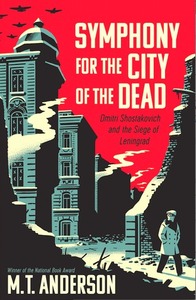You need to sign in or sign up before continuing.
Take a photo of a barcode or cover
370 reviews for:
Symphony for the City of the Dead: Dmitri Shostakovich and the Siege of Leningrad
M.T. Anderson
370 reviews for:
Symphony for the City of the Dead: Dmitri Shostakovich and the Siege of Leningrad
M.T. Anderson
This was pretty interesting. I didn't know anything about this part of Russian history, the Siege of Leningrad, or Shostakovich, so it was very interesting to learn about. I've read so much about other parts of World War 2 that it's hard to be shocked, but the atrocities the Russian people endured turned my stomach. I don't know how I heard about this book, but I'm glad I read it.
dark
informative
inspiring
dark
informative
reflective
medium-paced
challenging
dark
emotional
informative
sad
medium-paced
It didn’t interest me enough to keep going.
Despite the target age for readers of this book (which I didn't know until I looked at the reviews) Anderson's Symphony is a marvelous biographical account for all readers of a composer pinned between two tyrants. That Shostakovich survived Stalin's purges is miraculous, but the secret to his survival is in the crucial question this book poses: what does music mean?
Shostakovich danced around this question his whole life, because to answer it would have been his demise. At first he found the question absurd, until he found out that giving the wrong answer, an honest answer, would in fact get him killed. Stalin took his "art" very seriously. A piece of music or poetry could and did get artists sent to the camps, or sometimes simply shot. Shostakovich managed, somehow, to never give the wrong answer and never be silenced. That was incredibly difficult, and incredibly brave, in Stalin's Soviet Union.
And that is only the beginning -- after Stalin's terror came the War and a horrific siege that reduced Leningrad to the most inhumane circumstances imaginable. Anderson does not candy coat this horrifying story, but to alleviate the sheer horror of the Siege he places it in the context of Shostakovich's 7th Symphony -- this doesn't make the siege seem any less dire, but it gives meaning to the lives of those who suffered in it. And if the 7th "means" anything, it is to be found in that experience, and it remains for us in the music to hear.
Shostakovich danced around this question his whole life, because to answer it would have been his demise. At first he found the question absurd, until he found out that giving the wrong answer, an honest answer, would in fact get him killed. Stalin took his "art" very seriously. A piece of music or poetry could and did get artists sent to the camps, or sometimes simply shot. Shostakovich managed, somehow, to never give the wrong answer and never be silenced. That was incredibly difficult, and incredibly brave, in Stalin's Soviet Union.
And that is only the beginning -- after Stalin's terror came the War and a horrific siege that reduced Leningrad to the most inhumane circumstances imaginable. Anderson does not candy coat this horrifying story, but to alleviate the sheer horror of the Siege he places it in the context of Shostakovich's 7th Symphony -- this doesn't make the siege seem any less dire, but it gives meaning to the lives of those who suffered in it. And if the 7th "means" anything, it is to be found in that experience, and it remains for us in the music to hear.
"Years later, a German soldier told Eliasberg, '[The Seventh Symphony] had a slow but powerful effect on us. The realization began to dawn that we would never take Leningrad.' That was enough itself. 'But something else started to happen. We began to see that there was something stronger than starvation, fear, and death--the will to stay human.'"
emotional
informative
inspiring
medium-paced
This is my all time favorite book. Coming from a person who doesn't have favorites, this is a huge deal. However, audiobook is the o my way to enjoy the masterpiece. The reason is because the author and reader, M.T. Anderson intersperses Shostakovich's music throughout the work. This makes the story so much more powerful. I promise you will not be disappointed.
dark
emotional
informative
inspiring
reflective
medium-paced




